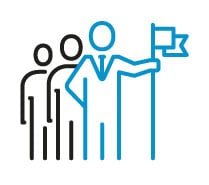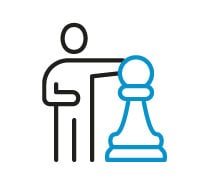KNOWLEDGE CENTER
Risks and Benefits of Executive Coaching
Company leaders are constantly investing time and money in improving the all-around development of their executives through executive coaching. Executive coaching aims to teach managers, executives, and other leaders how to learn, perform, balance, and exceed corporate and individual expectations or limitations. Leaders can expect to improve their leadership skills, self-confidence, emotional intelligence, empathy, flexibility of thinking, and more through executive coaching.
Unlocking a leader’s full potential can greatly benefit an organization, but it is not a miracle fix-all service. While there are many benefits of executive coaching, it is important to understand the service as a whole to avoid common pitfalls.
What Are the Benefits of Executive Coaching?
Executive coaching allows individual leaders to work with a mentor and progress step-by-step to accrue numerous advantages. Below are just some of the benefits of executive coaching that can be invaluable to the upper management or leaders of a company.

Social Skills
Refining a leader’s social skills enable them to be an excellent communicator, negotiator, team member and more.

Empathy
Executives are only as effective as their team and being able to understand another person’s emotions through empathy helps to build stronger interpersonal relationships and allows executives to lead while being sensitive to other employees.

Self-Awareness
Learning to be self-aware allows an executive to regulate and understand their feelings instead of blindly continuing old habits. Being self-aware also helps an executive extend their horizons and open up to new perspectives making them more empathetic.

Increased Cognition
Gaining perspective, empathy, self-awareness, or any other skill on this list will reveal more than just the superficial or obvious and by pushing the boundaries of your mind, you are stretching and strengthening your overall cognitive abilities.

Build Relationships
A great leader should know and have a connection with every team member regardless of background, religion, gender, or any other factor. Having a relationship with the team you lead lets you recognize when a team member is struggling or is hungry for more. Having a relationship with the people you lead lets the team feel like a family rather than a disjointed group of individuals.

Motivation
Motivation is also momentum-based; completing one task gives you a motivational boost to begin another task and push through the long work hours. Self-awareness produces intrinsic motivation to do better creating a cycle of overall self-improvement and when an executive is motivated to grow, that infectious motivation spreads throughout an organization generating a better workplace.

Improved Leadership
Leadership is about solving problems in an empathetic, sensitive, emotionally intelligent, and understanding way so that when subordinates have a problem, they are confident their leader can find a solution and feel they honestly care about the situation.
What Are the Risks of Executive Coaching?
Executive coaching can be a fruitful investment when provided at the right time, with the right executive coach, and to the right leader. However, if the wrong coach is provided at the wrong time to the wrong person, an organization can end up wasting resources and time. To reap the full benefits of executive coaching, you must understand the intended purpose of a coach and how to avoid common coaching risks.
Selecting a Coach
The executive coaching industry is largely unregulated and fragmented. Carefully screen, vet, and interview a potential executive coach for appropriate education and industry-relevant experience.
Ensuring Confidentiality
Executive coaching must find a balance between confidentiality and sharing information as too much confidentiality can greatly limit the effectiveness of the coach and sharing too much information might compromise the business or professional relationships.
Follow-up
Regardless of how productive and successful a coaching session is, if there is no long term follow up any short-term benefits will likely dissipate over time. The general rule is to schedule a follow up three to six months after the conclusion of a coaching series.
Selecting a Client to Receive Executive Coaching
For coaching to work, the client must be receptive and open to change. Someone who accepts feedback well is likely going to respond well to coaching while someone set in their ways may brush off a coach’s suggestions.
The Coach’s Role
An executive coach should not be a messenger, advocate, evaluator, or any role other than a coach as these roles taint the overall mission of providing benefits for both the executive and the company.
Why Hire an Executive Coach
There are many executive coaching benefits and bringing in an executive coach can greatly improve an organization. But keep in mind, it’s important to match the coach to the executive. Both have their own style, personality, experience and knowledge that can undermine the effectiveness of the coaching program. With the right coach, the right executive, at the right time, an executive can develop new skills, become a better leader, and spread their positive influence to improve their organization.
SkillSource Learning’s team of highly skilled executive coaches can help your organization grow in every area and department. Our executive and team coaching methodologies can help you leverage business imperatives while improving human values and relationships and focusing on the objective to be successful. Contact us today for more information on our coaching programs.

